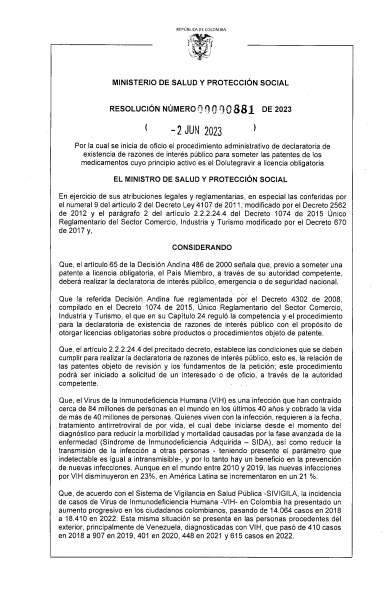UNAIDS welcomes the issuance of Resolution 881 of 2023 by the Ministry of Health of Colombia, which initiates the administrative procedure to evaluate the existence of reasons of public interest for issuing a compulsory license for dolutegravir (DTG)-based regimens. According to the ministerial resolution, the impact of this measure could mean a significant reduction of more than 80% of DTG’s price.
Dolutegravir (DTG) is an antiretroviral integrase inhibitor, recommended by the World Health Organization (WHO) as a first-line treatment option for people living with the human immunodeficiency virus (HIV). Regarding viral suppression and disease reduction, treatments incorporating DTG-based regimens have demonstrated greater adherence due to their lower incidence of adverse events while presenting enhanced effectiveness, safety, and reduced likelihood of resistance development.
Compulsory licensing is a provision in the World Trade Organization (WTO) Agreement on Trade Related Aspects of Intellectual Property Rights (“TRIPS Agreement”), that enables governments to supply its citizens with generic versions of patented treatments either through domestic production or imports, ensuring drug prices are affordable. WTO Inter-ministerial 2001 Doha Declaration reaffirmed the rights of member states to make use of all flexibilities in the agreement to protect public health, including compulsory licenses, “and the freedom to determine the grounds upon which such licenses are granted.” More recently, in the 2021 Political Declaration of the United Nations General Assembly High-level Meeting on AIDS, countries have committed to make use of TRIPS flexibilities “specifically geared to promoting access to medicines.”
"This resolution is a step forward to provide equal and sustainable access to best HIV treatment options for all people living with HIV in Colombia, nationals and migrants. This action shows the government’s commitment to close the treatment gap with assured quality affordable essential medicines which are easy to take and very well tolerated.”, says Andrea Boccardi, UNAIDS Director for the Andean Countries (Peru, Ecuador, Bolivia, and Colombia. "The government issued national guidelines in 2021, in line with WHO recommendations, but until now high prices of DTG have remained an obstacle to make it widely accessible to people living with HIV in Colombia."
The Colombian League for the Fight against AIDS and the IFARMA Foundation also celebrated the decision from the Colombian government. Both institutions participated on behalf of civil society in the updating of the Clinical Practice Guidelines (CPG) based on scientific evidence for the care of HIV/AIDS infection in adults, pregnant women and adolescents.
"The decision validates past initiatives of civil society in Colombia to achieve greater coverage of simplified treatments with fewer adverse effects at the lowest possible price, while at the same time it will reinvigorate the efforts of community-based organizations in education and promotion of adherence to ARVs, recognizing that structural barriers are factors that facilitate or hinder adherence to antiretroviral treatments", says Jorge Pacheco, Director of the Colombian League for the Fight against AIDS.
“Through this measure Colombia is taking an important step to guarantee people’s access to the most appropriate medication for them in line with international recommendations and commitments”, says Luisa Cabal, UNAIDS Regional Director for Latin America and the Caribbean. "Timely access to effective HIV treatment can save lives, improve health outcomes, enhance the quality of life, and contribute to the overall well-being of individuals living with HIV. This measure shows commitment to the global effort to combat inequalities in access to health."
UNAIDS commends and supports the Ministry of Health for its proactive approach to pursuing public interest and urges all stakeholders to collaborate in implementing Resolution 881 of 2023.
UNAIDS
The Joint United Nations Programme on HIV/AIDS (UNAIDS) leads and inspires the world to achieve its shared vision of zero new HIV infections, zero discrimination and zero AIDS-related deaths. UNAIDS unites the efforts of 11 UN organizations—UNHCR, UNICEF, WFP, UNDP, UNFPA, UNODC, UN Women, ILO, UNESCO, WHO and the World Bank—and works closely with global and national partners towards ending the AIDS epidemic by 2030 as part of the Sustainable Development Goals. Learn more at unaids.org and connect with us on Facebook, Twitter, Instagram and YouTube.



